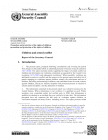Click to expand Image
A Sudanese soldier from the Rapid Support Forces or RSF stands on his vehicle during a military-backed tribe’s rally in the East Nile province, Sudan on June 22th, 2019.
© 2019 Hussein Malla/AP Photo
Sudan’s transitional government announced plans last week to create a new joint security force tasked with ensuring the rule of law and fighting security threats across the country. But the joint force is riddled with problems, not least of which is that some constituent forces have poor rights records.
The decision, signed by the leader of the Rapid Support Forces (RSF), General Mohamed Hamdan Dagalo (“Hemedti”), who also serves as vice chairperson of the transitional sovereign council, establishes the composition of the force to include Sudan’s Armed Forces (SAF), the police, the General Intelligence Service (GIS), and several rebel groups that signed a peace agreement.
The announcement, which comes amidst growing unrest across much of the country and a hard-hitting economic crisis, triggered well-founded concerns among Sudanese rights activists.
The formation of this nationwide joint force with a broad mandate to fight security threats has no legal basis neither under Sudan’s constitutional charter nor the October 2020 Juba peace agreement, which brought an end to hostilities between the government and several rebel groups.
Moreover, Sudan has not shown any sign of moving forward with much needed security sector reform. Deploying forces with poor rights records, which are neither trained nor equipped to conduct rule of law operations, creates an environment ripe for abuse, as we have already seen. On May 11, for example, SAF forces violently dispersed protesters in Khartoum, killing two and injuring others. In October last year, RSF forces killed five protesters in Kassala, eastern Sudan. The RSF also unlawfully detained scores of civilians in Khartoum last year, including one who was tortured to death by RSF elements.
Justifying a rights crackdown in the name of imposing the rule of law comes from the old authoritarian textbook that Sudanese know all too well, and which they have courageously protested against. Before moving forward with the deployment of a joint force, every proposed member of the force should be vetted, and those facing allegations of responsibility for serious human rights violations should be suspended, awaiting judicial investigation and determination of their cases. Rule of law operations should be conducted by well-trained and accountable law enforcement, and any plans to tackle security threats should integrate human rights principles, not embolden rights abusers.




